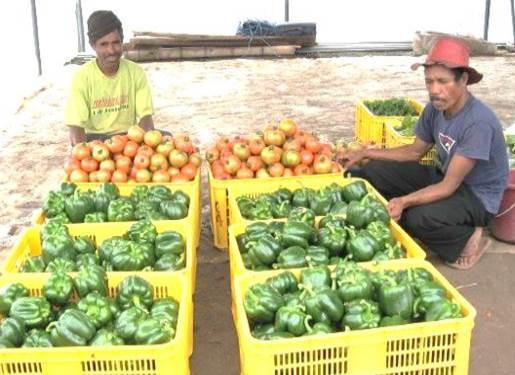|
Purpose: To accelerate inclusive and sustainable economic growth through increased productivity and profitability of the horticulture value chain and to promote nutrition and climate-smart agriculture activities that support increased food production, agricultural income, and women’s empowerment. |
Location: Municipalities of Aileu, Ainaro, Bobonaro, Ermera, and Dili. |
|
Key Counterparts: Ministries of Agriculture and Fisheries, Commerce and Industry, Education, and Health; Private Sector Organizations |
Duration: April 2015 - March 2020 |
|
Contract: $19,200,000 |
|
|
Partner Contact: Katherine Smith USAID’s Avansa Agrikultura Communications Officer Email: ksmith@avansaag.com |
USAID Contact: Kristopher Rowell (Toby) Agriculture Officer Email: krowell@usaid.gov |
Background
USAID’s Avansa Agrikultura (Avansa Agrikultura) Project is accelerating sustainable economic growth in the agriculture sector. At the end of the project, USAID anticipates that over 33,000 people in 250 communities will be earning higher incomes, with improved nutrition, and better managed economic assets.
Avansa Agrikultura is implemented in phases, building on progress achieved from previous development projects and new interventions. The project began activities in a small number of communities the first year and will scale up successful interventions to targeted communities over five years. It is also monitoring efficiency and effectiveness and making necessary adjustments over time.

More specifically, Avansa Agrikultura is addressing the key challenges of rural poverty, natural resource degradation, food insecurity and malnutrition. By promoting sustainable production practices, increasing the functionality of farmer groups and associations, improving market linkages, and increasing access to agriculture resources (such as seeds, fertilizer, and pesticides), the project will support economic growth in rural communities. The project will support sustainability by promoting sound policies, increasing resilience to climate change, and improving natural resource management.
Summary
USAID is building on development gains with farmers, buyers, and communities. The project is diversifying models of engagement beyond contract farming and expansion to new markets. A fundamental focus is developing long-term sustainability by strengthening the private sector and local partners that deliver services to rural farmers.
Select Project Highlights:
-
Established four demonstration farms and learning sites in Maloa (Dili) with Kmanek, Gleno (Ermera) with Ermera Extension Service, Quinta-Portugal (Aileu) with Dili-Mart, and Maubisse (Ainaro) with Ainaro Extension Service
-
Organized the “Women in Agribusiness Timor-Leste” conference bringing together over 170 stakeholders from the public and private sector to develop an action plan to further promote and support women’s economic empowerment
-
Developed and disseminated information on climate smart agriculture technologies, including Sloping Agriculture Land Technology, composting, forest nursey establishment, and annual vegetable and fruit crops
-
Facilitated seven Horticulture Working Group meetings with participation from MAF as a public-private dialogue platform around key issues affecting the horticulture sector, resulting in the creation of the Association Hortikultura de Timor-Leste
-
Conducted a Singapore Market Access Study Tour with public and private sectors to identify concrete exportation opportunities.








Comment
Make a general inquiry or suggest an improvement.